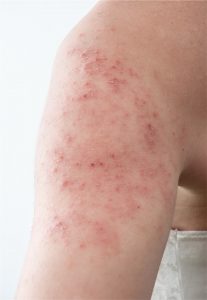Eczema is a common uncomfortable skin condition experienced by both children and adults. Symptoms vary per person but here are some of the most common:
- Itching which may be severe, especially over night
- Red thickened, cracked, dry, scaly skin patches, especially on the hands, feet, ankles, wrists, neck, upper chest, eyelids, inside the bend of the elbows and knees, and, in infants, the face and scalp
- Small, raised bumps, which may leak fluid and crust over when scratched
- Raw, sensitive, swollen skin from scratching
The exact cause is unknown but factors such as dry irritable skin, a gene variation that affects the skin’s barrier, decreased immune system, bacteria on the skin such as Staph, Environmental conditions have been linked.
Clink on this link to see our…
Dry Skin Care Recommendations
- Keep baths and showers short. Use warm, not hot water, and a mild cleanser. Gently pat the skin dry.
- Apply moisturizer after getting out of the bath or shower. Ointments and creams tend to be more effective than lotions.
- Read ingredients on skin care products. Deodorant soaps, alcohol-based toners, and products that contain fragrance can irritate dry, sensitive skin.
- Use a humidifier to add much-needed moisture to the air.
- Wear soft fabrics that breathe, such as 100% cotton. If you want to wear wool and other rough fabrics, wear a soft fabric underneath.
- Don’t skimp on hand washing, which can remove harmful bacteria and viruses. If you need to wash your hands frequently, hand sanitizers are a good alternative.
- Apply hand cream after each hand washing. If more relief is needed, dab petroleum jelly on your hands before bed. If your hands are frequently immersed in water, wear waterproof gloves to help protect them.

Worsening Factors of Atopic Dermatitis
- Dry skin resulting from long hot baths or showers
- Scratching, which causes further skin damage
- Bacteria and viruses
- Sweat
- Changes in Climate
- Solvents, cleaners, soaps, and detergents
- Dust and pollen
- Tobacco smoke and air pollution
Diagnosis
- Topical Steroids - These help with itching. Overuse of this drug may cause skin irritation or discoloration, thinning of the skin, infections, and stretch marks
- Creams that help repair the skin - Drugs called calcineurin inhibitors — such as tacrolimus (Protopic) and pimecrolimus (Elidel) — affect your immune system. Applied to the skin, they help maintain normal skin, control itching and reduce flares of atopic dermatitis.
- Oral Antibiotics - You may need antibiotics if you have a bacterial skin infection or an open sore or cracked skin caused by scratching. Your doctor may recommend taking oral antibiotics for a short time to treat an infection.
- Oral Antihistamines - These help with itching. Diphenhydramine (Benadryl, hydroxyzine) can make you sleepy and may be especially helpful at bedtime. Blue Light Photodynamic Therapy (PDT)
- Oral or Injected Steroids - For more-severe cases, a prescription for oral corticosteroids — such as prednisone — or an injected corticosteroid may be needed. These drugs are effective but can’t be used long term because of potential serious side effects
- XTRAC Laser - It is a targeted laser (specific light source with one wavelength) that we use to treat individual spots and areas to clear up this condition.
- Narrow band UVB - The simplest form of light therapy (phototherapy) involves exposing your skin to controlled amounts of natural sunlight.
Give us a call Today
Call to schedule an appointment to discuss the best treatment option for you.




